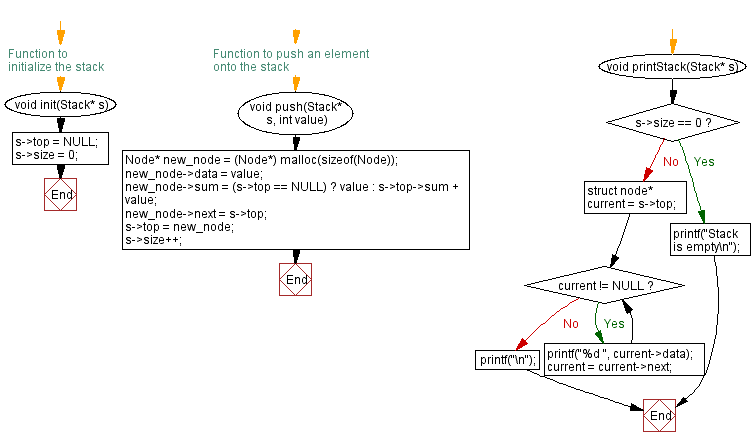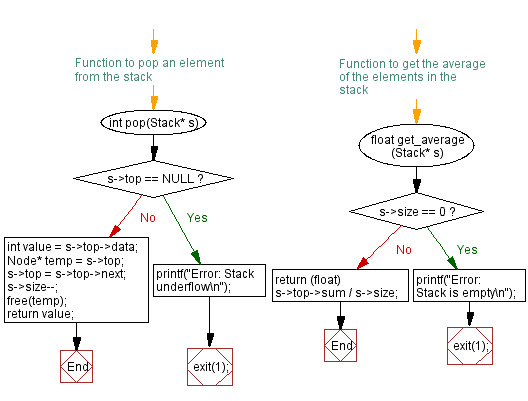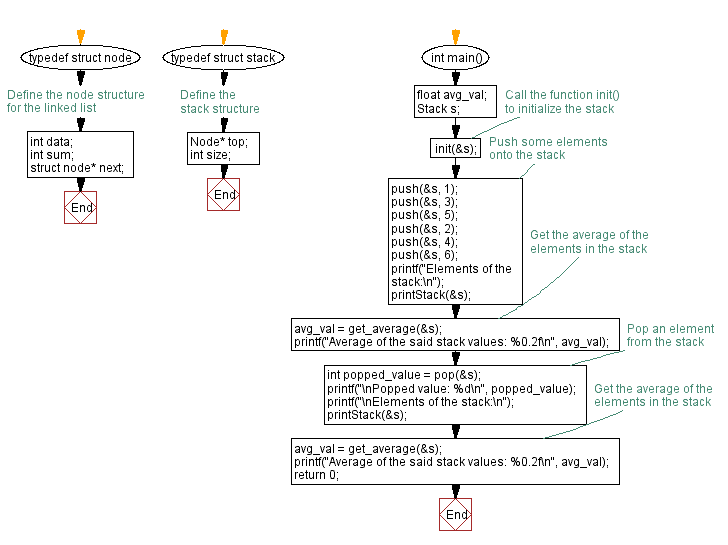C Exercises: Average value of the stack elements
14. Average and Statistical Measures of Stack
Write a C program to calculate the average value of the stack elements.
Sample Solution:
C Code:
#include <stdio.h>
#include <stdlib.h>
// Define the node structure for the linked list
typedef struct node {
int data;
int sum;
struct node* next;
} Node;
// Define the stack structure
typedef struct stack {
Node* top;
int size;
} Stack;
// Function to initialize the stack
void init(Stack* s) {
s->top = NULL; // Set top pointer to NULL indicating an empty stack
s->size = 0; // Initialize the size of the stack to 0
}
// Function to push an element onto the stack
void push(Stack* s, int value) {
Node* new_node = (Node*) malloc(sizeof(Node)); // Create a new node
new_node->data = value; // Set the data of the new node to the given value
// Calculate the sum of the stack elements up to this node
new_node->sum = (s->top == NULL) ? value : s->top->sum + value;
new_node->next = s->top; // Set the new node's next pointer to the top node
s->top = new_node; // Update the top pointer to the new node
s->size++; // Increment the size of the stack
}
// Function to pop an element from the stack
int pop(Stack* s) {
if (s->top == NULL) { // Check if the stack is empty
printf("Error: Stack underflow\n");
exit(1);
}
int value = s->top->data; // Get the data of the top node
Node* temp = s->top; // Create a temporary pointer to the top node
s->top = s->top->next; // Move the top pointer to the next node
s->size--; // Decrement the size of the stack
free(temp); // Free the memory of the popped node
return value; // Return the popped value
}
// Function to get the average of the elements in the stack
float get_average(Stack* s) {
if (s->size == 0) { // Check if the stack is empty
printf("Error: Stack is empty\n");
exit(1);
}
return (float) s->top->sum / s->size; // Calculate and return the average
}
// Function to print the elements of the stack
void printStack(Stack* s) {
if (s->size == 0) { // Check if the stack is empty
printf("Stack is empty\n");
return;
}
struct node* current = s->top;
while (current != NULL) { // Iterate through the stack and print each element
printf("%d ", current->data);
current = current->next;
}
printf("\n");
}
// Main function
int main() {
float avg_val;
Stack s;
// Call the function init() to initialize the stack
init(&s);
// Push some elements onto the stack
push(&s, 1);
push(&s, 3);
push(&s, 5);
push(&s, 2);
push(&s, 4);
push(&s, 6);
printf("Elements of the stack:\n");
printStack(&s);
// Get the average of the elements in the stack
avg_val = get_average(&s);
printf("Average of the said stack values: %0.2f\n", avg_val);
// Pop an element from the stack
int popped_value = pop(&s);
printf("\nPopped value: %d\n", popped_value);
printf("\nElements of the stack:\n");
printStack(&s);
// Get the average of the elements in the stack
avg_val = get_average(&s);
printf("Average of the said stack values: %0.2f\n", avg_val);
return 0;
}
Output:
Elements of the stack: 6 4 2 5 3 1 Average of the said stack values: 3.50 Popped value: 6 Elements of the stack: 4 2 5 3 1 Average of the said stack values: 3.00
Flowchart:



For more Practice: Solve these Related Problems:
- Write a C program to calculate the standard deviation of elements in a stack.
- Write a C program to update and display the average value of the stack after each push and pop operation.
- Write a C program to find both the average and median of the elements in a stack.
- Write a C program to compute the weighted average of stack elements based on their order of insertion.
Go to:
PREV : Middle Element Operations in Stack.
NEXT : Remove Minimum Element Variants.
C Programming Code Editor:
Have another way to solve this solution? Contribute your code (and comments) through Disqus.
What is the difficulty level of this exercise?
Test your Programming skills with w3resource's quiz.
